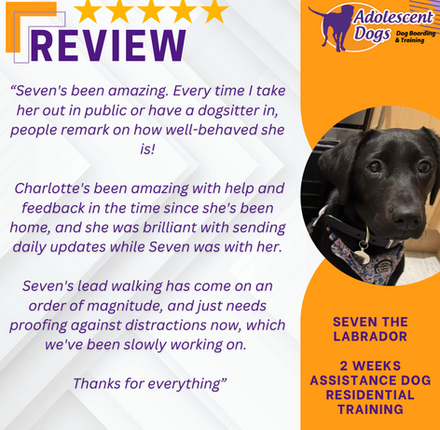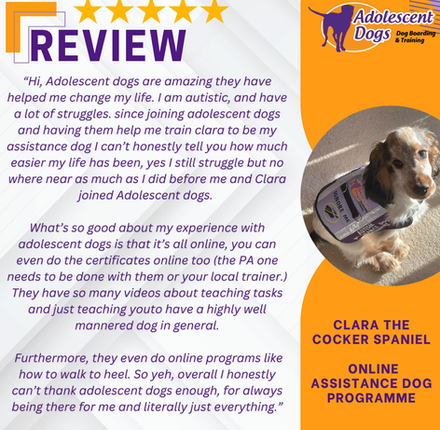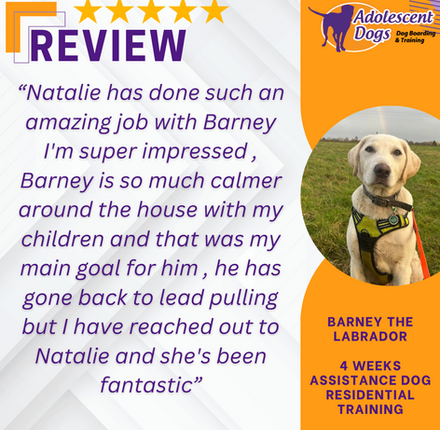
Assistance Dog Programme
At Adolescent Dogs, we offer one of the most comprehensive and accessible Owner-Trained Assistance Dog Programmes in the UK.
With over 19 years of experience, we provide unrivalled support for individuals training their own assistance dogs, covering a wide range of disabilities, including physical, medical, psychological, and neurological conditions.
Unlike other programmes, we have:
✅ No waiting lists – Start training right away: get approved and started within 24 hours
✅ No breed restrictions – All legal breeds are welcome.
✅ Design your own vests – Fully customisable to your own style and colours
✅ The most extensive training resources available – Over 450+ step-by-step video tutorials, task tutorials, structured training plans, live trainer support 7 days a week and weekly Live Q&A with the Head Trainer
✅ Training beyond the Internationally recognised standards– Our Gold Award level takes dogs beyond the Public Access Test, ensuring the highest level of reliability and control
✅ Flexible learning options – Train entirely from home with our Online Assistance Dog Programme and optional assistance dog workshops, or fast-track progress with our residential stays, One to one or Stay & Train programmes.
✅ Support for all stages – From puppy training to advanced public access skills, we guide you through every step.
✅ Public Access Tests Available –
Guildford, Surrey, Brighton, West Sussex, Birmingham and occasionally other locations in the UK


What Disabilities
Do We Support?
We support all disabilities where a dog can be trained to provide task-based assistance. Some of the conditions we work with include, but are not limited to:
🔹 Physical Disabilities – Including wheelchair users, PoTS, Ehlers-Danlos Syndrome, Fibromyalgia, Multiple Sclerosis, ME, Spina Bifida, Cerebral Palsy, spinal injuries, brain injuries, strokes, amputees, and more.
🔹 Medical Assistance Dogs – Supporting diabetes, high/low blood sugar, epilepsy, seizures, Addison’s disease, allergies, blood pressure regulation, migraines, Crohn’s disease, and non-epileptic seizures.
🔹 Guiding & Hearing Support – While we currently offer light guiding and hearing assistance training, our trainers are happy to support owners in developing these skills further.
🔹 Psychiatric & Neurological Assistance – Providing support for Autism, Down Syndrome, PTSD, C-PTSD, Dissociative Identity Disorder, FASD, Bipolar Disorder, Major Depression, Severe Anxiety, and more.
Dogs must be trained to mitigate symptoms through specific tasks such as deep pressure therapy, panic attack interruption, grounding techniques, or sensory regulation
🔹 Emotional Support Dogs – While emotional support dogs offer comfort and companionship, they do not qualify as assistance dogs in the UK and do not have public access rights.
Our fully trained assistance dog teams
Graduates of our programme exceed the Internationally Recognised Standard for Assistance Dogs, ensuring they are fully prepared for public access and disability-specific tasks.
Our fully trained teams:
🏆 Pass a Public Access Test exceeding recognised international standards.
📚 Complete advanced obedience & behaviour training to ensure reliability in all settings.
⏳ Log over 200+ hours of public access training before certification.
🦮 Perform disability-specific tasks tailored to their handler’s needs.
💛 Pass two temperament assessments to assess suitability for assistance work.
🩺 Are fully health checked by a vet, up to date with vaccinations and treatments.
📌 View our list of active members here.
Legal Recognition & Disability Requirements
To qualify for an assistance dog, handlers must meet the Equality Act 2010 criteria, meaning their disability must have a substantial and long-term impact on their ability to carry out daily activities. We do not discriminate based on diagnosis and welcome individuals with any condition that meets the legal definition of disability, including those with psychiatric conditions when recommended by a medical professional.
Our goal is to ensure every handler has access to the highest quality training and support to develop a life-changing partnership with their dog.
📌 Join our programme today and start your journey toward a fully trained assistance dog!
See below for the different training options available, including our online programme, residential training or one to one lessons


































































